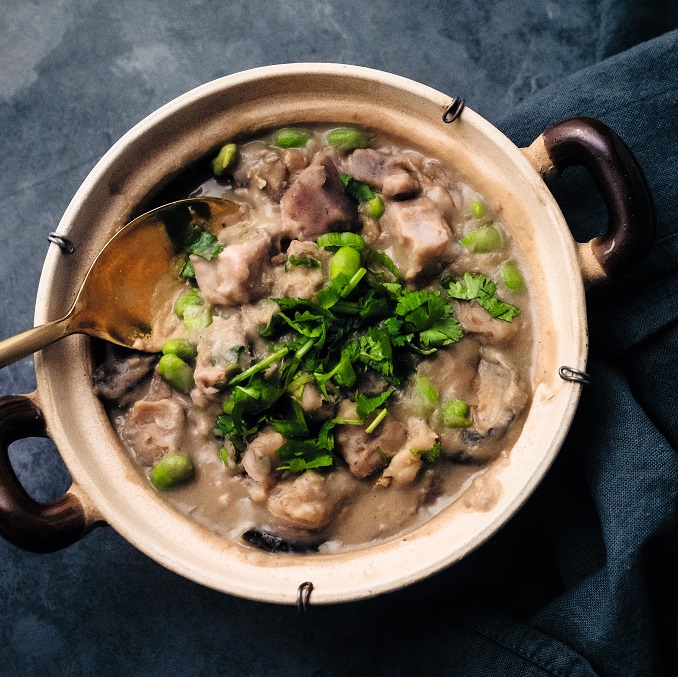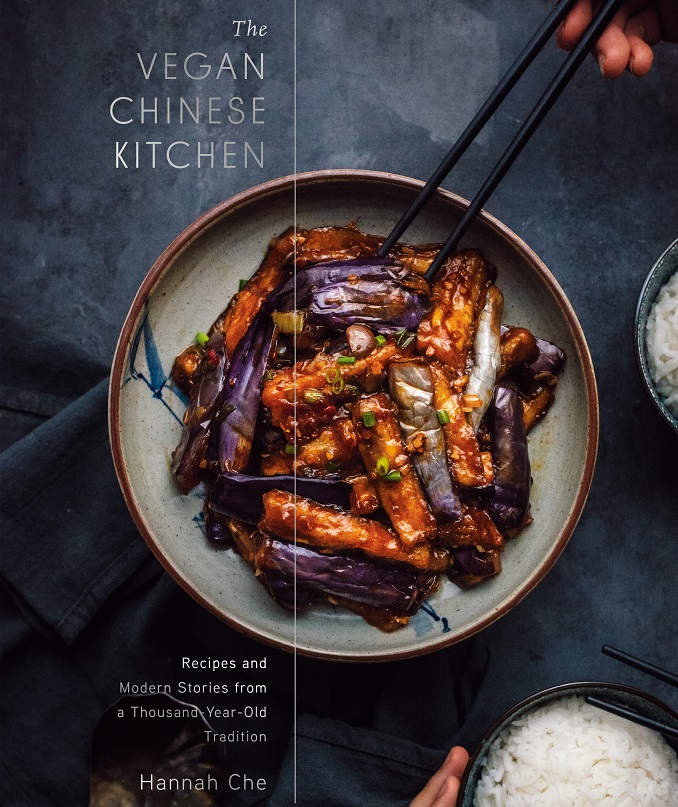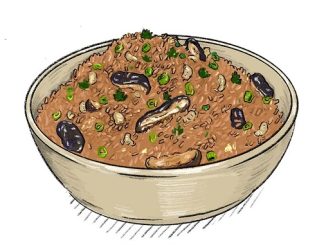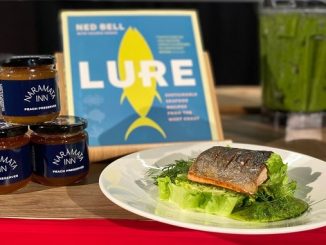Chef Hannah Che shared her recipe for Coconut Clay Pot Taro and Edamame from her book, The Vegan Chinese Kitchen – Modern Recipes and Stories from a Thousand-Year-Old Tradition.

Coconut Clay Pot Taro and Edamame
Serves 4
Ingredients:
– 4 large dried shiitake mushrooms
– 1 cup (240 mL) boiling water
– 1 medium (10 ounces / 280 grams) taro root
– 3 tablespoons Shallot Oil or vegetable oil, divided
– 1 (2-inch) piece (15 grams) ginger, unpeeled, washed and thinly sliced
– 3 garlic cloves, minced
– 2 tablespoons fermented soybean paste
– 1 cup cooked shelled edamame, thawed if frozen
– 1 cup (240 mL) unsalted stock of any kind or water
– ½ cup full-fat coconut milk
– 1 tablespoon sugar
– ½ teaspoon kosher salt, plus more to taste
– ¼ teaspoon ground white pepper
– Handful of fresh cilantro, both stems and leaves finely chopped
Directions:
In a small bowl, cover the mushrooms with the boiling water and place another bowl or plate on top to weigh them down. Soak for 30 minutes.
Meanwhile, peel the taro and cut it into 1-inch cubes. In a skillet or wok, heat 2 tablespoons of the shallot oil over medium-high heat until shimmering and then add the taro. Sear the taro in the hot oil, flipping occasionally, until golden brown on the edges, about 4 minutes.
Remove from the pan.
Drain the shiitake mushrooms, reserving the soaking liquid, snip off and discard the stems, and cut the caps on a diagonal into 3 or 4 thin slices each. Set a clay pot on or return the wok to the stovetop over medium-low heat and heat the remaining 1 tablespoon shallot oil until it shimmers.
Add the ginger and mushrooms and stir-fry until the edges of the mushrooms start to brown and stick, about 3 minutes. Add the garlic and fermented bean paste and stir-fry until most of the moisture has sizzled out of the paste and it smells delicious, about 20 seconds. Add the cooked taro and edamame, then pour in the stock and coconut milk. Season with sugar and salt to taste—this will depend on the saltiness of your soybean paste.
Cover and cook for 15 to 18 minutes, until the taro has absorbed most of the liquid and is completely cooked through and fork-tender. Add the white pepper, top with the cilantro, and serve immediately.
***

The Vegan Chinese Kitchen – Modern Recipes and Stories from a Thousand-Year-Old Tradition, By Hannah Che. Featuring over 100+ fresh, plant-based, umami-packed recipes for regional Chinese classics we all know and love.
Hannah Che is a cook, writer, and photographer based in Oregon, USA. Born and raised in Detroit, Michigan, she lived in China for several years with her family and most recently spent a year travelling throughout China and training as a chef at the Guangzhou Vegetarian Culinary School. She is the creator of the blog The Plant-Based Wok.
When Hannah Che decided to become a vegan, she was concerned that it would alienate her from the traditions and food that her Chinese family celebrated. But that was before she learned about Zhai cai, or vegetarian cooking, a fascinating subset of Chinese cookery that emphasizes umami-rich ingredients and can be traced back over hundreds, if not a thousand, years to Buddhist temple kitchens.
In The Vegan Chinese Kitchen, Hannah Che shows us the magic of the highly developed and creative tradition in which nearly every dish in the Chinese repertoire can be replicated in a meatless way, such as Blistered Dry-Fried String Beans, Sweet and Sour Tofu, Sichuan chilli-oil wontons, or using spicy mushrooms in dan-dan Noodles. As a graduate of the prestigious Guangzhou Vegetarian Culinary School – the only culinary institute in China dedicated to traditional vegetarian cooking – Hannah brings a strong sense of authenticity to the subject of plant-based Chinese cuisine.
In the book, readers will find recipes that are naturally plant-based with a rich culinary history that are as irresistible as they are nourishing. The Vegan Chinese Kitchen will delight vegans and omnivores alike, inviting them not only to explore a whole new world of flavours and ingredients, but also to create conversations about food, cultural traditions and identity, and wholesome, sustainable cooking.




